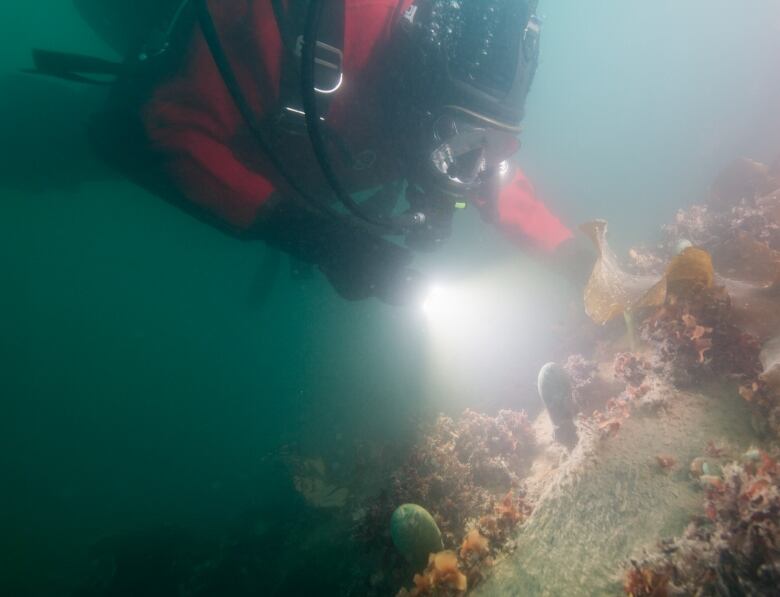Britain to get 1st major exhibition of Canada's Franklin artifacts
As Parks Canada negotiates ownership, Franklin expedition artifacts will head to Britain for exhibition

The first major exhibition of artifacts from the sunken Arctic wreck of HMS Erebus is planned during Canada's 150th birthday next year — but Canadians will have to travel to Britain to see it.
The Franklin expedition show, sponsored in part by the Canadian Museum of History, will debut in 2017 at the National Maritime Museum in Greenwich, England, CBC News has learned.
The British unveiling is the latest twist in a controversy over ownership and control of unique artifacts from Sir John Franklin's 19th-century quest for the Northwest Passage.
Inuit organizations claim co-ownership rights and have demanded the objects be displayed locally in Gjoa Haven, Nunavut.

A few of the 54 artifacts that Parks Canada divers retrieved from HMS Erebus were shown to the public over the Victoria Day weekend in 2015, at the museum's Gatineau, Que., building. They were all submerged inside seawater tanks to help preserve them before restoration could begin.
A replica of the ship's bell was presented at the Royal Ontario Museum in Toronto on Dec. 18, 2014, created using a 3D printer.
The 6,000-square-foot Greenwich exhibition will include up to 22 Erebus objects, shown alongside the National Maritime Museum's existing collection of Franklin-related material.
The Erebus artifact ownership dispute was heightened with the September discovery of the sunken wreck of the second ship, HMS Terror, from Franklin's infamous Arctic expedition that left England in 1845. No artifacts have been retrieved yet from that wreck.
Exception of gold
Canada signed a memorandum of understanding with the United Kingdom in 1997, acknowledging that Britain owned the Franklin wrecks and their contents whenever they might be found. Britain agreed to assign ownership of artifacts to Canada, with the exception of any gold or any objects of "outstanding significance to the Royal Navy."
Britain also agreed to compensate Canada "all reasonable costs associated with the recovery, conservation and transportation of such artifacts."

The memorandum "was crafted with some vagueness that does state the intent to transfer the artifacts to Canada, but allows for some interpretation and/or ambiguity, including on process," says a June email by a senior Parks Canada official.
CBC News obtained several hundred pages of internal Parks Canada documents related to the ownership talks through the Access to Information Act.
This bell is jointly owned by the government of Nunavut and the Inuit Heritage Trust.- Nunavut Premier Peter Taptuna asserting his government's claim to the ship's bell of HMS Erebus
Canada wants Britain to sign a clearer, "legally binding" memorandum of understanding, as well as an ownership-transfer protocol, and a third agreement on loans and research.
In the meantime, Inuit groups and the government of Nunavut have each demanded that Ottawa recognize their ownership rights over the artifacts. They say those rights arise from Article 33 of the 1993 Nunavut Land Claim Agreement, which includes the icy seas where the ships eventually sank after becoming entrapped in ice in 1846.
Parks Canada, the lead government agency, recently acceded to the demands of the Inuit for eventual co-ownership, even though legal counsel advised that the land-claims deal does not apply to the Erebus artifacts.
By accepting Inuit co-ownership "beyond strict legal interpretation," Parks Canada is helping to renew relationships with Aboriginal people, part of Canada's commitment to the United Nations Declaration on the Rights of Indigenous Peoples, says an internal policy document from August.
Parks Canada, however, has not accepted Nunavut's co-ownership claims. "More policy analysis is required to determine the government position with respect to the [Nunavut's] claim to ownership," says the document.
Politically awkward
Doug Stenton, a Nunavut spokesman, said the government welcomes the decision on Inuit co-ownership, but continues to press its own claims on the Erebus objects.
Nunavut Premier Peter Taptuna formally objected to the ship's bell display in 2014 at the Royal Ontario Museum "with no input from the government of Nunavut."
"We were not consulted about the decision to make reproductions of the bell from HMS Erebus," he wrote at the time. "This bell is jointly owned by the government of Nunavut and the Inuit Heritage Trust."
The issue is politically awkward because Parks Canada has for years required archeological permits from Nunavut to authorize its searches for HMS Erebus and HMS Terror.

A spokeswoman for the Canadian Museum of History, Stephanie Verner, said the Erebus artifacts might be presented elsewhere in Canada after the 2018 show in Gatineau. "However, those details have not yet been finalized," she said.
Sending upward of 22 HMS Erebus objects to Greenwich for next year's exhibition is also fraught, because Canada requires an export permit signed by the owner or owners — something still in flux and potentially in dispute.
A spokeswoman for Nunavut Tunngavik Inc., which represents Inuit in the Franklin artifacts dispute, declined comment to CBC.
Parks Canada spokeswoman Meaghan Bradley said no agreement has been reached yet with Britain, which is still the sole owner of the artifacts. "We continue to work in good faith of future co-ownership of the Franklin artifacts," she said.
Follow @DeanBeeby on Twitter

